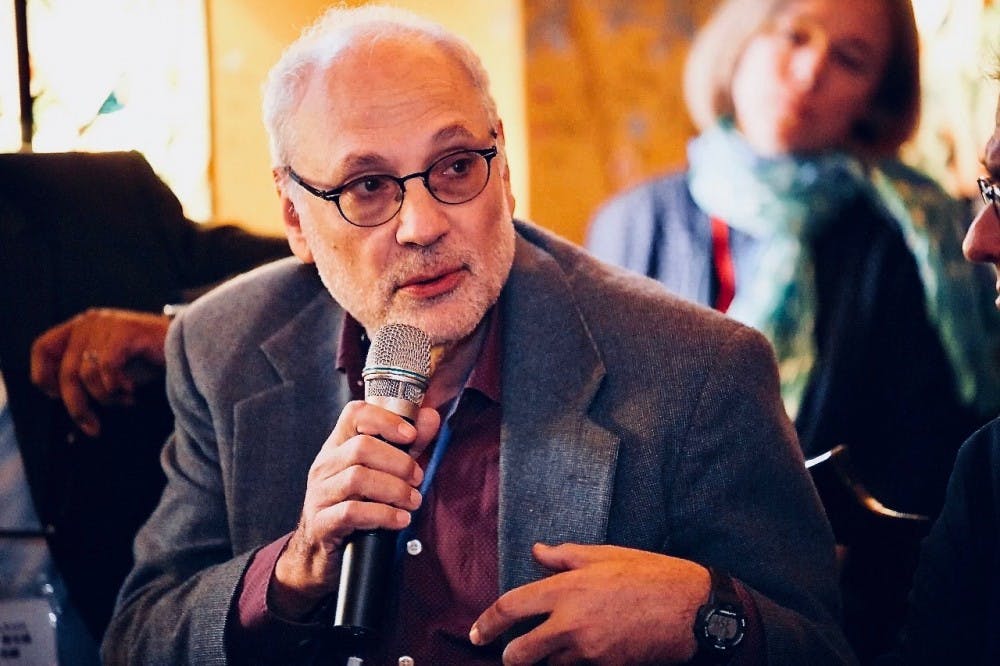
English professor Charles Bernstein, recipient of the Bollingen Prize — one of the the highest awards for an American poet — is retiring from Penn at the end of the semester. (Photo from Charles Bernstein)
After teaching at Penn for more than 15 years, esteemed poet and English professor Charles Bernstein is set to retire at the end of the semester.
The influential poet, who is the Donald T. Regan Professor of English and Comparative Literature at Penn, recently won the Bollingen Prize for American Poetry, one of the highest awards for an American poet, for his book "Near/Miss."
“For me, poetry is like the art. It's making art with verbal language,” Bernstein said in an interview with The Daily Pennsylvanian. “I've always been obsessed with verbal language and almost hearing it as if it was popping out at me.”
Bernstein said that he was grateful but surprised for the recognition, given his unorthodox style of poetry. The first poem in “Near/Miss” separates the syllables in words onto different lines, and makes the reader work to understand it.
“A lot of what I do is, obviously to the people giving awards, not the right kind of thing," Bernstein said. "It remains controversial and disliked by a lot of people who give out awards in the mainstream of culture, because it's so strange that it doesn't follow conventional patterns."
College junior Arundhati Singh, who has taken three classes with him, was glad Bernstein received the award. “He deserves all the recognition he can get, but it's not very out of place or surprising,” Singh said.
Before helping people discover their love of poetry in college, Bernstein said his interest in writing began “probably before birth in the womb." But it wouldn't be until college when he actually started writing and found his love for poetry.

Bernstein helped found the L=A=N=G=U=A=G=E movement. (Photo from Charles Bernstein)
Bernstein's impact on poetry can be seen in his contributions to the L=A=N=G=U=A=G=E movement, which he helped found in the 1960s.
Al Filreis, Faculty Director of the Kelly Writers House, described the poetry form as "typically non-narrative" and "disjunctive."
"Things were not in any kind of common sense order," Filreis said. "Another characteristic of this poetry is that it would take American English idioms and fool with them, torque them, twist them, create puns of idioms."
At Penn, Bernstein is renowned as a professor for questioning his students, and pushing their boundaries of thought. 2018 College graduate Amanda Silberling said she credits Bernstein with helping her "develop the way that I see poetry and art."
Silberling recalled a favorite moment with Bernstein, when she proposed to him that anything could be a poem.
“He was like, ‘Really, what about this chair?’ and just picks up a chair and asked me if I thought it was a poem. Then I had to defend it, and we had this whole conversation about it," Silberling said.
Students celebrated him for encouraging "uncensored, critical discourse" in the classroom. “He encouraged his students to think outside of the box and ask a question that maybe they wouldn't have had the courage to ask otherwise,” Silberling said.
Outside of the classroom, Bernstein helped create PennSound with Filreis, a large collection of recorded poetry readings that emphasizes the auditory aspect of the art.
“The performance of the poem is equally significant as the poem,” Bernstein said. “When you hear the poet reading their own work, you get certain aspects to it that you can't get in the alphabetic version, such as the rhythms, or the tempo, or the speed, the intonation, or the pitch changes.
Bernstein said he is retiring so that he can travel more and enjoy more free time, but is nevertheless reluctant to leave Penn.
“I'm gonna miss teaching them,” Bernstein said. “The main thing about being a professor over the last 30 years has been working with students.”
The Daily Pennsylvanian is an independent, student-run newspaper. Please consider making a donation to support the coverage that shapes the University. Your generosity ensures a future of strong journalism at Penn.
Donate







